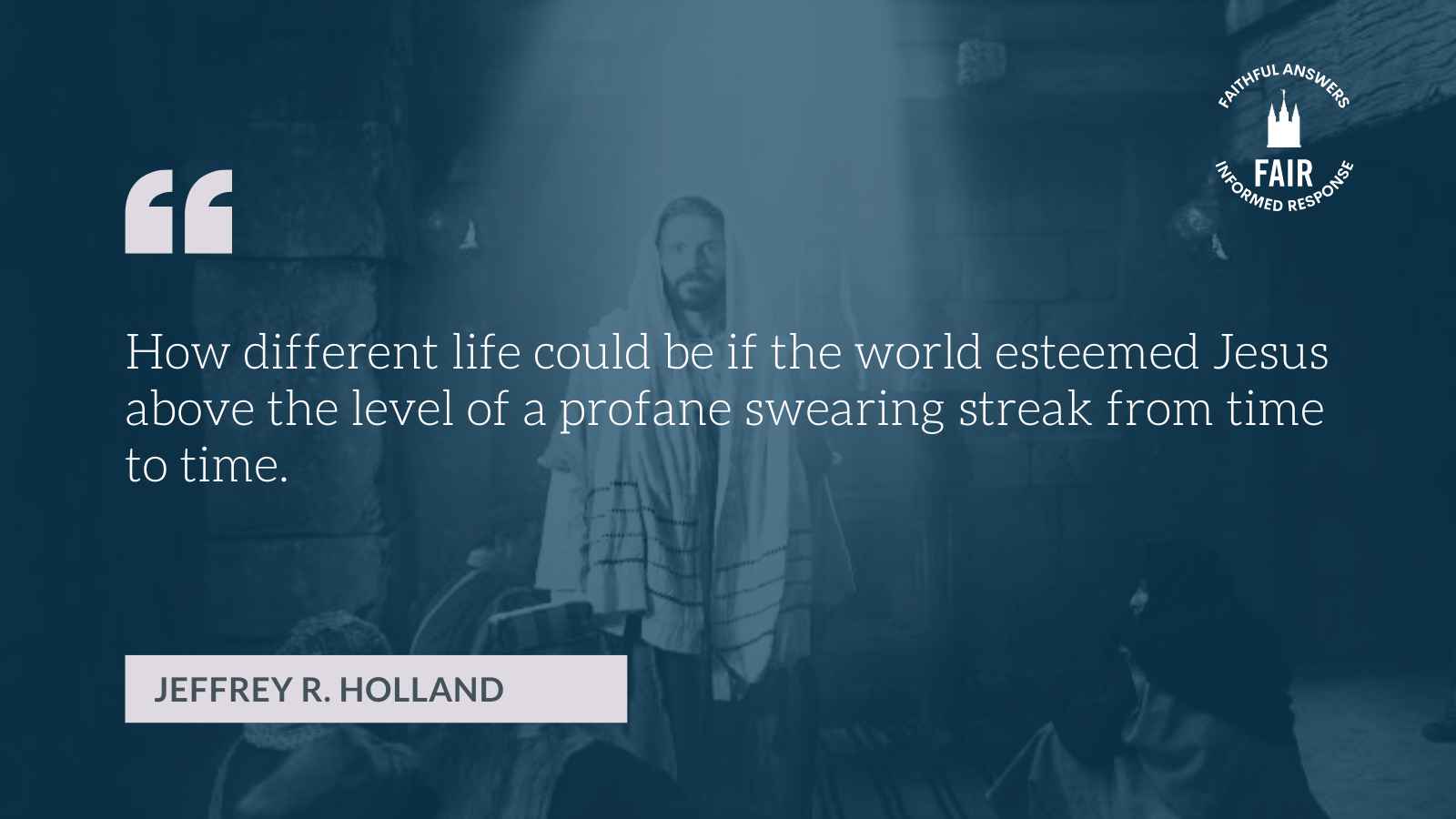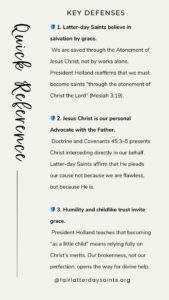
Reclaiming Grace, Advocacy, and the Humble Path to Salvation
Have you ever wrestled with the accusation that Latter-day Saints believe we must “earn” our salvation? Or wondered how we reconcile commandments with the doctrine of grace?
In his tender and deeply symbolic message, As a Little Child, President Jeffrey R. Holland invites us to return to a place of purity, trust, and humility—where divine grace flows freely and Christ’s role as our Advocate with the Father becomes central to our hope and healing. Through sacred stories and scriptural insight, President Holland shows that it is not achievement that saves us, but our willingness to come to Christ “as a little child.”
This message aligns beautifully with Doctrine and Covenants 45, where the Savior pleads with the Father on our behalf and offers light amid the gathering darkness. As we seek to reclaim and clarify terms like grace, mediator, and advocate, President Holland’s testimony helps us refute distorted narratives and reaffirm the heart of restored doctrine: We are saved by grace, through the merits, mercy, and advocacy of Jesus Christ.

 Apologetic Issues: Grace and Advocacy in Salvation
Apologetic Issues: Grace and Advocacy in Salvation
Misconception: Latter-day Saints believe they have to earn their way to heaven.
Response:
This common critique misrepresents the Latter-day Saint understanding of salvation. President Holland’s talk powerfully reinforces that grace is central to salvation, and that we are to approach Christ with the humility and trust of a child—not with a checklist of perfect performance. He quotes Mosiah 3:19, which teaches that we must “[become] saints through the atonement of Christ the Lord,” underscoring that it is through Christ—not through our own merit—that we are saved.
Doctrine and Covenants 45 reaffirms this doctrine as the Savior pleads our case before the Father, saying, “Father, behold the sufferings and death of him who did no sin … wherefore, Father, spare these my brethren.” The very concept of an Advocate presupposes dependence on grace, not self-sufficiency.
Common Fallacy: Straw Man
A Straw Man Fallacy misrepresents an argument in a simplified or distorted way to make it easier to attack. Critics often distort LDS beliefs by claiming we teach “works-only salvation,” which is a misrepresentation of our actual doctrine. In truth, the restored gospel affirms that grace is essential, and good works are a response to—not a replacement for—that divine gift.
Solution:
Salvation in Latter-day Saint theology is not a reward for flawless behavior but a covenant relationship of trust with Christ, who lifts, pleads, and empowers us to become something more than we could on our own.
Misconception: Obedience is about proving our worth to God.
Response: President Holland’s emphasis on childlike purity, trust, and humility reveals that obedience is not about earning divine love—it’s about cultivating the conditions of heart that allow grace to operate. He contrasts childlike receptivity with the “vain imaginations” and pride of the world, suggesting that grace flows best into humble vessels.
Like children who trust instinctively and love freely, we access the power of the Atonement not by presenting a résumé of righteousness, but by coming to Christ ‘as a little child’.
Cognitive Bias: Just-World Hypothesis
This bias assumes that people get exactly what they deserve—that good things happen to good people and bad things to bad people. Applied to religious belief, it can distort the gospel into a merit-based system, where blessings (or salvation) are seen as rewards for perfect behavior, and suffering or struggle is interpreted as evidence of unworthiness.
The idea that obedience is about “proving your worth” to God stems from this bias. It leads some to believe that grace must be earned or that divine love is conditional. But this misunderstanding overlooks the essential truth taught by President Holland: grace is not earned—it is given to the humble, the trusting, and the broken-hearted.
 Solution: Reframe grace as divine generosity, not divine transaction.
Solution: Reframe grace as divine generosity, not divine transaction.
Help others recognize that God is both just and merciful, and that Christ’s Atonement interrupts the idea that we get only what we “deserve.” Obedience is not proof of worthiness—it is a way to invite divine partnership and keep our hearts aligned with the Giver of all good things. Encourage others to shift their view of commandments from a spiritual scoreboard to a spiritual compass, leading them toward healing and transformation in Christ.

 Apologetic Application: Grace, Advocacy, and the Humble Path to Salvation
Apologetic Application: Grace, Advocacy, and the Humble Path to Salvation
 Core Doctrine: We are saved by grace through the advocacy of Jesus Christ
Core Doctrine: We are saved by grace through the advocacy of Jesus Christ
President Holland’s talk and Doctrine and Covenants 45 both affirm the foundational Christian doctrine that salvation comes through grace, not merely by effort, and that Jesus Christ acts as our Advocate before the Father. The Savior pleads for us not because we are perfect, but because He is. As D&C 45:4–5 teaches:
“Father, behold the sufferings and death of him who did no sin … wherefore, Father, spare these my brethren that believe on my name.”
This doctrine highlights both grace (in the sense of unearned divine favor) and Christ’s advocacy (His intercessory role).
 Defending Core Beliefs
Defending Core Beliefs
1⃣ Misconception: Latter-day Saints believe salvation must be earned through flawless obedience.
 Clarification: Salvation is not a matter of merit, but of becoming—becoming childlike in trust, humility, and submission. These are the conditions of heart that allow grace to operate fully.
Clarification: Salvation is not a matter of merit, but of becoming—becoming childlike in trust, humility, and submission. These are the conditions of heart that allow grace to operate fully.
President Holland highlights virtues such as purity, trust, and courage—qualities often found in children—which position us to receive divine help. He contrasts this with the pride and superficiality of the world, showing that those who “humble [themselves] as this little child” are most aligned with the kingdom of God. The gospel does not require perfection; it requires willingness to be transformed by Christ’s grace.
2⃣ Misconception: Latter-day Saints focus too much on works and not enough on Christ.
 Clarification: Far from minimizing Christ, Doctrine and Covenants 45 and President Holland’s message center everything on Him. The imagery of Christ pleading our cause, paired with the parable-like story of Easton offering the sacrament, reminds us that it is Christ’s merit, not ours, that saves. Our role is not to “prove” our worth but to trust in His.
Clarification: Far from minimizing Christ, Doctrine and Covenants 45 and President Holland’s message center everything on Him. The imagery of Christ pleading our cause, paired with the parable-like story of Easton offering the sacrament, reminds us that it is Christ’s merit, not ours, that saves. Our role is not to “prove” our worth but to trust in His.
This understanding helps correct the common narrative that members of the Church rely on works for salvation. In reality, our doctrine teaches that we are lifted, justified, and sanctified by Jesus Christ, and our obedience is a reflection of our love—not a demand to earn entrance into heaven.
3⃣ Misconception: Latter-day Saints believe grace must be earned through works.
 Clarification: President Holland directly refutes this in As a Little Child by teaching that we “becometh a saint through the atonement of Christ the Lord” (Mosiah 3:19). This passage does not describe a transactional gospel—it describes a transformational relationship rooted in trust and humility. Grace is not a reward for flawless behavior; it is the enabling power of Christ made available to those who come unto Him with childlike hearts.
Clarification: President Holland directly refutes this in As a Little Child by teaching that we “becometh a saint through the atonement of Christ the Lord” (Mosiah 3:19). This passage does not describe a transactional gospel—it describes a transformational relationship rooted in trust and humility. Grace is not a reward for flawless behavior; it is the enabling power of Christ made available to those who come unto Him with childlike hearts.
Application for Clarifying Misunderstandings:
This doctrine helps clarify that:
- Grace is not earned—it is accepted with humility, like a child receiving a gift.
- Obedience is not payment—it is partnership, drawing us into alignment with the One who has already paid the price.
 Practical Apologetic Use:
Practical Apologetic Use:
When responding to critics, you might say:
“We don’t believe we earn heaven. We believe Jesus Christ earned it for us—and now invites us, as children, to walk the path He made possible. Our efforts reflect gratitude, not transaction.”
 Historical and Doctrinal Connections
Historical and Doctrinal Connections
During a time of unrest and uncertainty in early Church history, Doctrine and Covenants 45 was received as a revelation of hope. The Saints were facing persecution, financial hardship, and confusion about the signs of the times. Into this darkness, the Lord offered not fear—but light, advocacy, and divine promises fulfilled.
 Doctrinal and Historical Context:
Doctrinal and Historical Context:
The Lord’s declaration in D&C 45:3–5 that He will plead our cause before the Father echoes ancient intercessory roles found in scripture. In Isaiah 53, Christ is portrayed as the suffering servant who bears our griefs. In the Book of Mormon, Alma teaches that Christ will “take upon him the sins of his people” (Alma 7:13). These ancient witnesses find modern reaffirmation in both restored scripture and President Holland’s prophetic witness.
President Holland’s talk reflects the prophetic continuity of these doctrines. His testimony of Christ’s humility, advocacy, and loyalty mirrors the doctrine of Christ as our Mediator, fulfilling His eternal role in both ancient prophecy and modern covenant.
 Doctrine and Covenants Connection:
Doctrine and Covenants Connection:
This week’s Come, Follow Me lesson in Doctrine and Covenants 45 ties into President Holland’s talk in a powerful way:
“Father, behold the sufferings and death of him who did no sin … spare these my brethren that believe on my name.” (D&C 45:4–5)
President Holland teaches that children—and by extension, all humble followers of Christ — are closest to the kingdom of God. His story of Easton becoming a deacon and striving to serve unaided parallels Christ’s own offering, highlighting that it is humility, not perfection, that draws us into the arms of divine mercy.
The doctrine that we are saved by grace and sustained by Christ’s advocacy offers hope amid uncertainty—just as it did in the early days of the Restoration. Understanding that Jesus stands with us and for us strengthens faith, disarms fear, and roots discipleship in joyful trust.
Living Apologetics: Applying the Doctrine of Grace and Advocacy Today
 Concern: How can we help others understand that Latter-day Saints believe in salvation by grace?
Concern: How can we help others understand that Latter-day Saints believe in salvation by grace?
1⃣ Clarify that grace is foundational, not optional.
When asked, “Do Latter-day Saints believe they’re saved by works?” you might respond:
“We believe we’re saved by grace—and that Christ asks us to follow Him. Our efforts don’t earn salvation; they express our faith in His gift.”
Hint: Use Mosiah 3:19 and D&C 45:4–5 to show that salvation comes through Christ, not through a checklist.
2⃣ Reclaim the word Advocate.
In conversations, emphasize that Latter-day Saints believe Christ personally intercedes for us. Use the courtroom analogy:
“Imagine Christ standing beside you before the Father, saying, ‘Look at Me—spare them.’ That’s what we believe about grace and the advocacy of Christ.”
 Faith in Action: Three Ways to Share These Insights
Faith in Action: Three Ways to Share These Insights
 1. Conversations with Christian friends – When grace comes up, quote D&C 45 and Mosiah 3 to show how Christ’s intercession is central to our beliefs.
1. Conversations with Christian friends – When grace comes up, quote D&C 45 and Mosiah 3 to show how Christ’s intercession is central to our beliefs.
 2. Teaching youth or adults – Ask, “What does it mean that Christ is our Advocate?” Let them reflect on what grace feels like, not just how it’s defined.
2. Teaching youth or adults – Ask, “What does it mean that Christ is our Advocate?” Let them reflect on what grace feels like, not just how it’s defined.
 3. Missionary Moments – When someone asks if we “believe in Jesus,” bear testimony that He is our Savior, Intercessor, and ever-faithful Friend.
3. Missionary Moments – When someone asks if we “believe in Jesus,” bear testimony that He is our Savior, Intercessor, and ever-faithful Friend.
 Personal Study & Faith-Building Practices
Personal Study & Faith-Building Practices
 1. Study the parable of the ten virgins alongside D&C 45:56–57 – Ask: “What does it mean to be spiritually prepared without becoming self-reliant?”
1. Study the parable of the ten virgins alongside D&C 45:56–57 – Ask: “What does it mean to be spiritually prepared without becoming self-reliant?”
 2. Write a grace-centered testimony – Try finishing this sentence: “I know I need Jesus Christ because…” and share it with someone.
2. Write a grace-centered testimony – Try finishing this sentence: “I know I need Jesus Christ because…” and share it with someone.
 3. Sing or read the hymn “I Stand All Amazed” (Hymns no. 193) – Reflect on what it teaches about Christ’s personal advocacy and atoning grace.
3. Sing or read the hymn “I Stand All Amazed” (Hymns no. 193) – Reflect on what it teaches about Christ’s personal advocacy and atoning grace.
Conclusion: Grace for the Childlike Heart
President Jeffrey R. Holland’s message is a tender and timely reminder that salvation is not a prize for the perfectly disciplined but a gift for the humbly devoted. In a world that often equates worth with performance, President Holland points us back to the Savior—our Advocate, our Mediator, our Redeemer—who invites us to come unto Him as a little child: broken, trusting, and open to His grace.
Doctrine and Covenants 45 reveals a Savior who actively pleads our cause, holds up His own sacrifice in our behalf, and brings us safely home. These truths do more than comfort us—they defend our faith against the false narrative that Latter-day Saints believe we must “earn” heaven.
 As you reflect on this talk and this week’s study, ask yourself:
As you reflect on this talk and this week’s study, ask yourself:
Am I trying to prove myself to God—or am I trusting Christ to transform me?

The Consider Conference series by FAIR offers an in-depth look at recent General Conference talks to help members of the Church of Jesus Christ of Latter-day Saints navigate common questions, misunderstandings, and criticisms. Each post provides doctrinal insights, historical context, and practical ways to apply gospel principles in everyday conversations. Through this series, we hope to equip readers with faith-promoting resources that encourage thoughtful reflection, respectful dialogue, and a stronger foundation in gospel truths, fostering both personal conviction and meaningful discussions with others.
The post As a Little Child appeared first on FAIR.
Continue reading at the original source →



